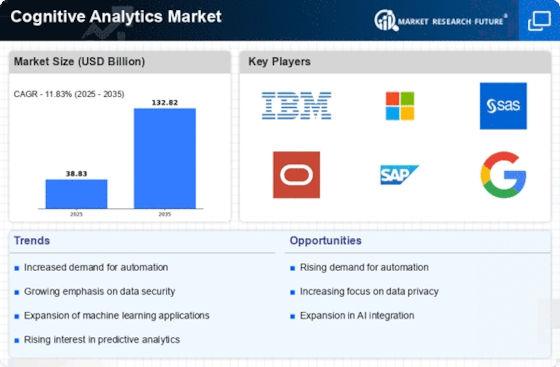Market Trends
Key Emerging Trends in the Cognitive Analytics Market
Major shifts towards sophisticated information analysis and interpretation are being witnessed in the cognitive analytics market. This trend has been informed by an increasing number of organizations in diverse industries that are beginning to recognize the capabilities of cognitive analytics as a means of drawing valuable insights from huge volumes of unstructured data. Consequently, this allows for more intelligent and human-like ways of dealing with data through cognitive analytic solutions because of the rising use of artificial intelligence (AI) and machine learning technologies. One major trend within the Cognitive Analytics Market is its inclination toward real-time data analysis. In response to this, businesses are looking for cognitive analytics tools capable of delivering instant insights on consumer behavior, market trends, and operational efficiency. Hence, companies can be proactive in their decision-making process and react quickly to changes in the marketplace due to its continuous capability. There has also been a rise in demand for real-time processing capability among cognitive analytics solutions, which has created innovation and competition within this sector. Furthermore, another recent development is integrating other technologies such as IoT (Internet of Things) plus big data analysis into cognitive analytics. Such an integration enables businesses to predict machine failures, optimize supply chain activities, and improve overall business efficiencies using cognitive analytics. Finally, convergence is happening across different technologies within the field, leading to more comprehensive and robust analytical solutions and creating a wider perspective for the cognitive analytics market. Additionally, the retail e-commerce sector is increasingly demanding cognitive analytics capabilities in response to customer experience personalization. These tools enable companies to have a better understanding of what their customers like and dislike as well as other sentiments, such as sentiment analysis. They are also able to provide personalized product recommendations and target their marketing campaigns accordingly; this helps improve overall customer service and enhances customer satisfaction and loyalty levels. The use of cognitive analytics for patient care improvement, medical research acceleration, and clinical operation streamlining is on the rise in the healthcare industry. Consequently, healthcare delivery outcomes are being revolutionized through medical record analysis using cognitive analytic tools that diagnose diseases and determine treatment options. Additionally, organizations are shifting towards cloud-based cognitive analytic solutions due to their need for flexible and cost-effective analytic platforms that can be easily modified.


















Leave a Comment